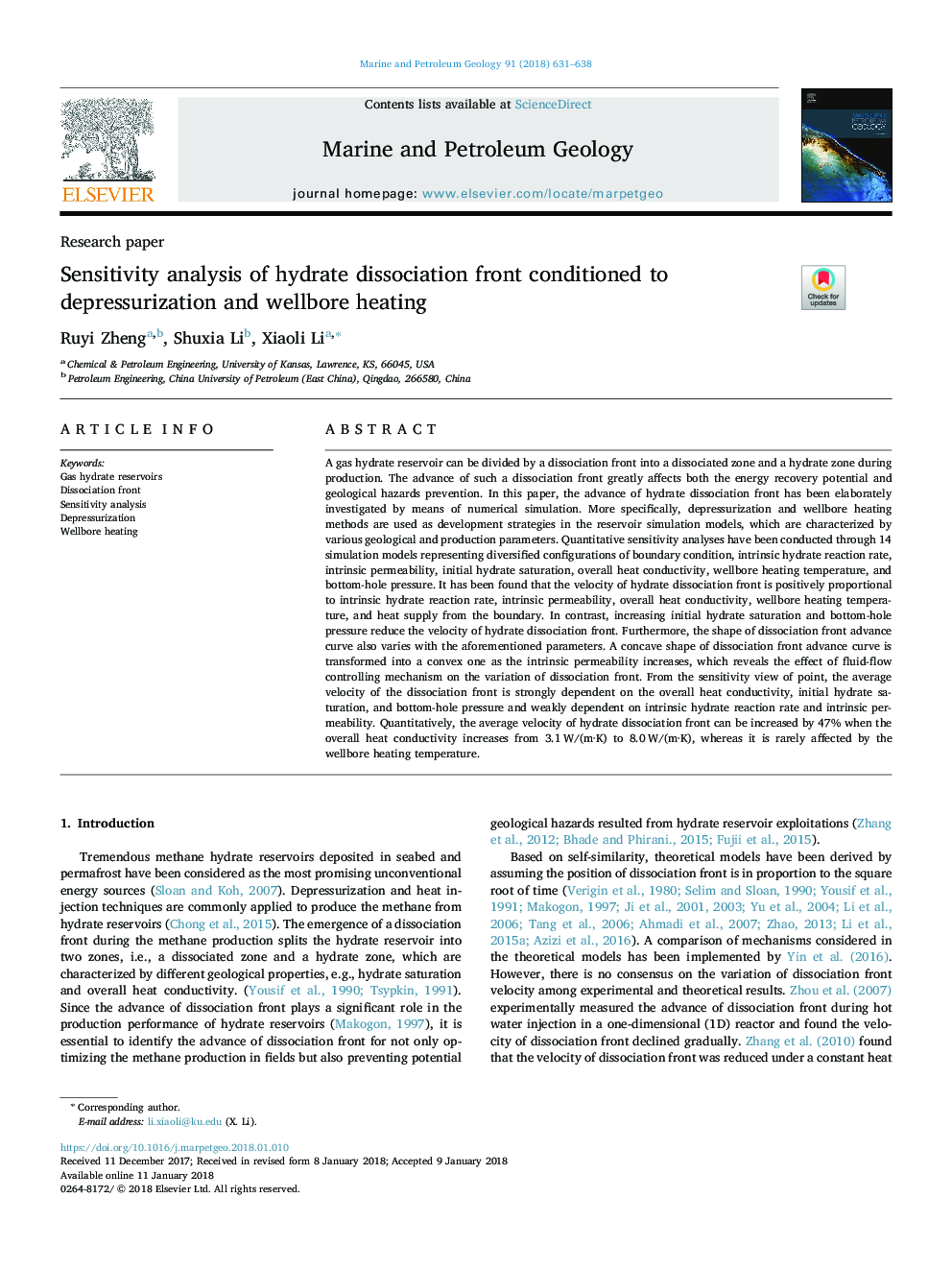| کد مقاله | کد نشریه | سال انتشار | مقاله انگلیسی | نسخه تمام متن |
|---|---|---|---|---|
| 8909218 | 1637134 | 2018 | 8 صفحه PDF | دانلود رایگان |
عنوان انگلیسی مقاله ISI
Sensitivity analysis of hydrate dissociation front conditioned to depressurization and wellbore heating
ترجمه فارسی عنوان
تجزیه و تحلیل حساسیت جلوی اختلاف هیدرات به علت کم فشار سازی و گرمایش آب شیرین است
دانلود مقاله + سفارش ترجمه
دانلود مقاله ISI انگلیسی
رایگان برای ایرانیان
کلمات کلیدی
مخازن هیدرات گاز، تقسیم جبهه، تجزیه و تحلیل میزان حساسیت، کاهش فشار، گرمایش چاه،
موضوعات مرتبط
مهندسی و علوم پایه
علوم زمین و سیارات
زمین شناسی اقتصادی
چکیده انگلیسی
A gas hydrate reservoir can be divided by a dissociation front into a dissociated zone and a hydrate zone during production. The advance of such a dissociation front greatly affects both the energy recovery potential and geological hazards prevention. In this paper, the advance of hydrate dissociation front has been elaborately investigated by means of numerical simulation. More specifically, depressurization and wellbore heating methods are used as development strategies in the reservoir simulation models, which are characterized by various geological and production parameters. Quantitative sensitivity analyses have been conducted through 14 simulation models representing diversified configurations of boundary condition, intrinsic hydrate reaction rate, intrinsic permeability, initial hydrate saturation, overall heat conductivity, wellbore heating temperature, and bottom-hole pressure. It has been found that the velocity of hydrate dissociation front is positively proportional to intrinsic hydrate reaction rate, intrinsic permeability, overall heat conductivity, wellbore heating temperature, and heat supply from the boundary. In contrast, increasing initial hydrate saturation and bottom-hole pressure reduce the velocity of hydrate dissociation front. Furthermore, the shape of dissociation front advance curve also varies with the aforementioned parameters. A concave shape of dissociation front advance curve is transformed into a convex one as the intrinsic permeability increases, which reveals the effect of fluid-flow controlling mechanism on the variation of dissociation front. From the sensitivity view of point, the average velocity of the dissociation front is strongly dependent on the overall heat conductivity, initial hydrate saturation, and bottom-hole pressure and weakly dependent on intrinsic hydrate reaction rate and intrinsic permeability. Quantitatively, the average velocity of hydrate dissociation front can be increased by 47% when the overall heat conductivity increases from 3.1â¯W/(m·K) to 8.0â¯W/(m·K), whereas it is rarely affected by the wellbore heating temperature.
ناشر
Database: Elsevier - ScienceDirect (ساینس دایرکت)
Journal: Marine and Petroleum Geology - Volume 91, March 2018, Pages 631-638
Journal: Marine and Petroleum Geology - Volume 91, March 2018, Pages 631-638
نویسندگان
Ruyi Zheng, Shuxia Li, Xiaoli Li,
